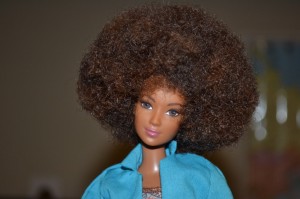Why we should be talking about hair
 There is a pervasive sentiment that hair is a superficial aspect of beauty. Yet for many women of color, hair is quite the contrary. Hair is an expression of self – who I am and where I’ve been. Before I get too deep, let’s take a moment to recognize the obvious – all women, regardless of race, view hair differently. For Black women, however, this view may be shaped by historical significance (e.g., Black is Beautiful movement), family influences and social upbringing (preferences for straight and non-straight styles) or matters of convenience. Google ‘Black women and hair’ and I’m sure you’ll get more information than you could ever imagine about the complexity of Black women’s hair. Therefore, to downplay its relevance in our social conversation is insensitive and dismissive of the real way that hair matters to the lives of African American women.
There is a pervasive sentiment that hair is a superficial aspect of beauty. Yet for many women of color, hair is quite the contrary. Hair is an expression of self – who I am and where I’ve been. Before I get too deep, let’s take a moment to recognize the obvious – all women, regardless of race, view hair differently. For Black women, however, this view may be shaped by historical significance (e.g., Black is Beautiful movement), family influences and social upbringing (preferences for straight and non-straight styles) or matters of convenience. Google ‘Black women and hair’ and I’m sure you’ll get more information than you could ever imagine about the complexity of Black women’s hair. Therefore, to downplay its relevance in our social conversation is insensitive and dismissive of the real way that hair matters to the lives of African American women.
Recently I came across this article, and while it saddened me, it certainly did not surprise me. Shaming anyone, much less a 7-year old child, about the way she chooses to wear her hair is unacceptable. I could deconstruct the baseless rationale given by the Deborah Brown Community School administrators regarding their harassment of Tiana Parker about her decision to wear locs. But that’s too easy. Instead, I wonder how different Millard Jones is from the rest of us. I wonder how, consciously or unconsciously, we as a society are imparting negative messaging about hair and beauty into the minds of our little girls and disempowering them in the process. Even more, I wonder what type of behavior we are modeling as Black women. When we run through the rain or avoid exercise/swimming because we don’t want to get our hair wet and ‘revert’ – are we sending a positive message? And while I overstand that economic considerations, such as salon costs and time for hair maintenance can be prohibitive, I would like to propose an alternative. Let’s shift the conversation. Let’s pen a new narrative for the mental and physical health of our children. Let’s model active behavior that can be achieved regardless of hairstyle. Let’s reaffirm that beauty comes from within. Let’s allow our girls to see reflections of themselves – in us.
I don’t claim to be wise, but if there is one thing I am certain of – children pay attention to what you do, not necessarily to what you say. So if we are telling our daughters, nieces and granddaughters that they are beautiful, but still we complain about doing their kinky hair, give them chemical relaxers at age 5, tell them to be careful not to ‘sweat their hair out’ and encourage them to wear their hair in ‘acceptable’ styles, then we are no better than the Deborah Brown Community School administrators. We are all reproducing a damaging cycle to the psyche that devalues the natural beauty of Black hair.
Perhaps if I were so inclined, I would design a public health intervention to visit cities and rural towns across the nation on a U R Enough Crusade. I don’t need tons of funding or a complicated research plan; just one bullhorn and a single message: You are enough. Your hair is enough. The way your hair grows out of your head is enough. Whatever way you choose to rock your ‘do, know that your hairstyle does not dictate your self-worth or value. That is all. Even without the bullhorn, I hope this message spreads (as it seems to be doing):
May your hair be enough to make you feel pretty, valued and empowered!
Visit NBCNews.com for breaking news, world news, and news about the economy